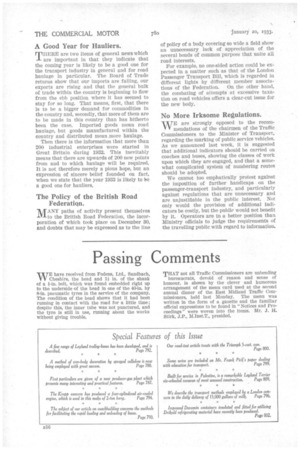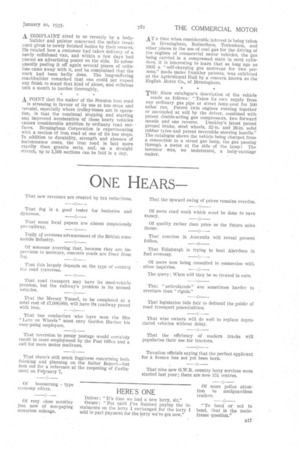Passing Comments
Page 30

Page 31

If you've noticed an error in this article please click here to report it so we can fix it.
WE have received from Fodens, Ltd., Sandbach, Cheshire, the head and lb in. of the shank of a fi-in. bolt, which was found embedded right up to the underside of the head in one of the 40-in. by 8-in, pneumatic tyres in the service of the company. The condition of the head shows that it had been running in contact with the road for a little time; despite this, the inner tube was not punctured, and the tyre is still in use, running about the works without giving trouble. THAT not all Traffic Commissioners are unbending bureaucrats, devoid of reason and sense of humour, is shown by the clever and humorous arrangement of the menu card used at the second annual dinner of the East Midland Traffic Commissioners, held last Monday. The menu was written in the form of a gazette and the familiar official expressions to be found In "Notices and Proceedings" were woven into the items. Mr. J. H. Stirk, J.P., Minst.T., presided. A COMPLAINT aired to us recently by a body builder and painter concerned the unfair treatment given to newly finished bodies by their owners.' He related how a customer had taken delivery of a newly cellulosed van, and within a few days had pasted an advertising poster on the side. In subsequently peeling it off again several pieces of cellulose came away with it, and he complained that the work had been badly done. The long-suffering coachbuilder remarked that one could not expect any finish to stand that kind of abuse, and cellulose took a month to harden thoroughly.
A POINT that the maker of the Stanton iron road is stressing in favour of its use at bus stops and tennii5i, especially where trolley-buses are in operation, is that the -continual stopping and starting and improved 'acceleration of these heavy vehicles causes considerable attrition to ordinary road surfaces. Birmingham Corporation is experimenting with a section of iron road at one of its bus stops. In addition to durability, strength and absence of maintenance costs, the iron road is laid more rapidly than granite setts, and, on a straight stretch, up to 1,500 sections can be laid in a day. AT a time when considerable interest is being taken in Birmingham, Rotherham, Tottenham, and other places in the use of coal gas for the driving of the engines of commercial motor vehicles, the gas being carried in a compressed state in steel cylinders, it is interesting to learn that as long ago as 1902 a " self-charging gas motorcar for two persons," made under Dunkley patents, was exhibited at the Agricultural Hall by a concern known as the English _Motor Co., of Birmingham.
THE Show catalogue's description of the vehicle reads as follows: "Takes its own supply from any ordinary gas pipe or street lamp-post for 100 miles' run. Patent twin engines running together or uncoupled at will by the driver, combined with patent double-acting gas compressors, two forward speeds and one reverse. Dunkley's latest patent ground brake, steel wheels, 32-in, and 26-in, solid rubber tyres and patent reversible steering handle." The eatalogue shows the vehicle being charged from a connection to a street gas lamp, the gas passing through a meter at the side of the lamp ! The inventor was, we understand, a baby-carriage maker.




























































































